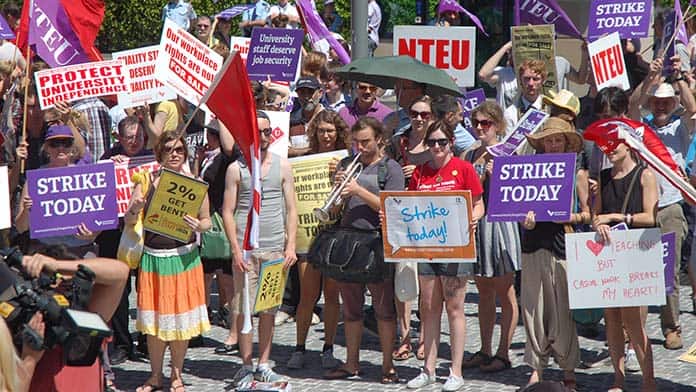An unprecedented national assembly of university workers has condemned the job cuts and funding cuts to the university sector and resolved to mobilise against them, including going on strike.
More than 460 staff from around the country attended the assembly on 24 August and committed to, “mounting a vigorous campaign of coordinated actions with the goal of making democratically planned unprotected industrial action possible so as to defend universities from funding cuts and protect all university jobs”.
The successful assembly was organised by the National Higher Education Action Network, a rank and file grouping of NTEU members.
The size and diversity of the assembly shows there is a new layer of staff coming into struggle for the first time and keen to push the bounds of what is possible. There are a lot of steps between taking a vote like this and getting a mass strike off the ground, but the sentiment needs to be nurtured and connected to campaigns on campuses.
There were also non-union members at the assembly. These workers can be won to joining the union and taking collective action, but there needs to be a clear strategy for building power and confidence.
On a number of campuses union members are already leading campaigns against the cuts. At the University of Melbourne, an open letter against hundreds of job cuts has been launched and there is an online rally planned.
At Sydney University, hundreds-strong members’ meetings in the Arts and Social Sciences Faculty have condemned the 30 per cent cuts mooted there and resolved to campaign against them through mobilisations, up to and including industrial action. There is also a push for a vote of no confidence in the Dean of the Faculty and upper management.
Staff are also preparing to join the next student protest planned for 16 September, and there is a push for a staff walk-off as part of this. NTEU branch officials should support and amplify these initiatives.
At UTS, shamefully, the NTEU officials have refused to organise a members’ meeting for over two months despite a clear resolution from the previous members’ meeting calling for one. It has been left to ordinary members to convene a meeting to plan the resistance to the cuts announced by the Vice-Chancellor.
Seeking “transparency” about the cuts is not good enough, the NTEU leadership needs to come out strongly against the cuts and help organise the resistance.
Connecting the fights
All of these local campaigns are absolutely critical. But at the same time as targeting the Vice-Chancellors and university management we also need to target the Liberals’ refusal to extend JobKeeper to universities, and their plans to further slash university funding and hike student fees.
These two campaigning angles are not counter-posed, as some groups like NTEU Fightback have claimed. Large demonstrations against the cuts, jointly organised with student activists, will strengthen union members’ confidence and willingness to fight—especially if the plans for fee increases can be stopped.
The motion passed at the national assembly called for a major mobilisation in October around the time of the federal budget. This would be a perfect opportunity to connect the struggles against the Vice-Chancellors’ cuts to the Liberals’ attacks.
The NTEU leadership is still pushing its dodgy deals that cut pay and conditions around different campuses. But having been embarrassed by the rank and file revolt against the deals, it has now pivoted to spruiking its Fund Universities Fairly campaign, which consists mostly of lobbying federal politicians. If it is serious about winning fair funding the NTEU leadership should support an October rally and build it among the membership.
Our most powerful weapon against the cuts is large-scale strike action. But that does not mean serious action has to wait until next year’s bargaining, as NTEU Fightback have argued.
We need to begin campaigning against the cuts now by mobilising on the largest scale possible, including through online meetings, protests and walkouts. But every action needs to build towards the kind of strike action we need.
The success of the assembly shows there is a sentiment to fight back right now, and we need to seize on this to push for the most militant action possible.
To get a mass strike means winning NTEU branches to support this strategy. Of course, the officials that were spruiking the surrender agreement of the Jobs Protection Framework will not lead the call for this. But if they endorse actions like the October rally, it makes it easier for activists to argue for more militant action as part of this.
Most union members still look to union endorsement of actions to give them security.
But being part of mass mobilisations can give them the confidence to go beyond what the union officials are prepared to support.
By Miro Sandev






